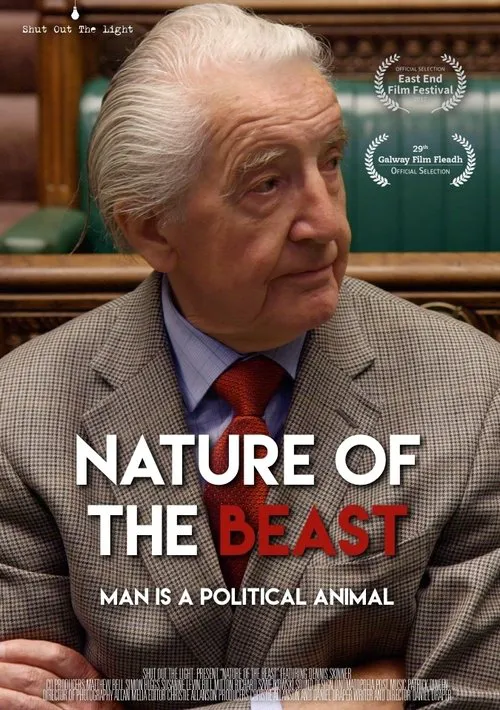Nature of the Beast

Plot
The documentary "Nature of the Beast" is a poignant and thought-provoking exploration of the life and career of Dennis Skinner, a fiercely independent and unapologetic Member of Parliament who has represented the constituency of Bolsover in Derbyshire since 1970. Skinner's remarkable story weaves together a rich tapestry of politics, social history, and personal reflection, offering a unique insight into the evolution of the Labour Party and the changing fortunes of progressive politics in Britain over the past half-century. The film opens with Skinner sitting in his modest Bolsover home, surrounded by the trappings of a life dedicated to public service. As he recounts his childhood in a coal-mining community, it becomes clear that Skinner's early experiences shaped his future as a champion of working-class causes. Growing up in a family of modest means, Skinner saw firsthand the struggles of ordinary people to make ends meet, and he developed a deep empathy for those who felt marginalized and disempowered by the capitalist machine. Skinner's entry into politics was not a calculated move, but rather a natural extension of his commitment to social justice. As a young man, he was active in the Labour Party and participated in the 1970 general election as a candidate for Bolsover. His initial victory was a surprise to many, but it also marked the beginning of a long and storied career that would see him become one of the most feared and respected politicians in Parliament. The 1970s proved to be a transformative period for Skinner and his constituents. As the British coal-mining industry faced increasing pressure from globalization and declining demand, Skinner became a key figure in the national debate on the future of the mines. He threw himself into the battle to save the industry, using his sharp wit and unwavering determination to hold the government to account for its policy decisions. The film shows Skinner in all his glory, speaking in Parliament with unflinching candor, questioning government ministers with ruthless efficiency, and rallying his constituents with a mix of humor and passion. His commitment to the cause of the miners was unwavering, even as the industry began to decline and the once-thriving communities of Bolsover and beyond faced the harsh realities of closure and unemployment. As the Labour Party underwent a shift towards the "centre-ground" in the 1980s, Skinner's uncompromising stance on issues like trade union rights, social welfare, and nationalized industries made him an increasingly lonely figure within the party. His reputation as a rebel was cemented by his involvement in high-profile battles, including his infamous "catwalk" protest through the division lobbies in 1983, in which he joined a group of Labour MPs in a symbolic gesture of defiance against the party leadership. Yet Skinner's unyielding commitment to his principles was not simply a gesture of defiance; it was a testament to his unwavering dedication to the people of Bolsover, who had entrusted him with their vote. As the film reveals, Skinner's work on behalf of his constituents was not limited to Parliament; he was also a tireless campaigner, using his platform to raise awareness about issues like poverty, healthcare, and education, and to mobilize support for local causes and campaigns. The "Nature of the Beast" is a nuanced and deeply personal portrait of Dennis Skinner, as much as it is a broader exploration of the state of progressive politics in Britain. As the documentary shows, Skinner's unwavering commitment to his values has made him a target for both government forces and media outlets, which often portray him as a relic of a bygone era. However, the film argues persuasively that Skinner's authentic voice and uncompromising style remain essential to the health of British politics. In an era where spin and PR dominate the headlines, Skinner's willingness to speak truth to power, and to hold those in authority accountable for their actions, is a beacon of hope and integrity. Throughout the film, Skinner reflects on his own legacy, acknowledging the controversies and contradictions of his career, but still affirming his commitment to the values that have guided him throughout. As he looks back on the highs and lows of his time in Parliament, Skinner recognizes that progress is often incremental, and that the struggle for social justice is a long-term effort that requires endurance, resilience, and a willingness to challenge the status quo. The "Nature of the Beast" is a testament to the power of politics to inspire and motivate, as much as it is a cautionary tale about the dangers of complacency and the erosion of progressive values. In the end, Skinner's story is both a reflection of his remarkable individual life and a broader commentary on the state of British politics in the late 20th century. As the documentary concludes, it is clear that Dennis Skinner's legacy will continue to resonate with future generations, inspiring those who follow in his footsteps to carry on the fight for a more just and equitable society.
Reviews
Recommendations



